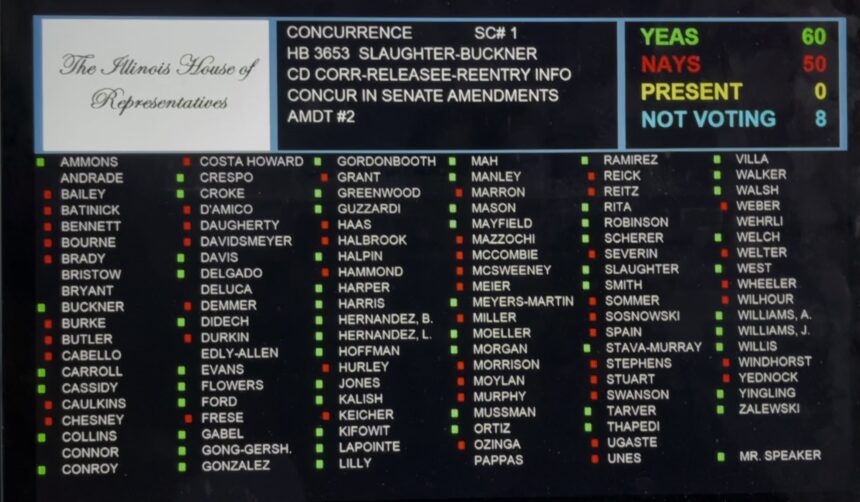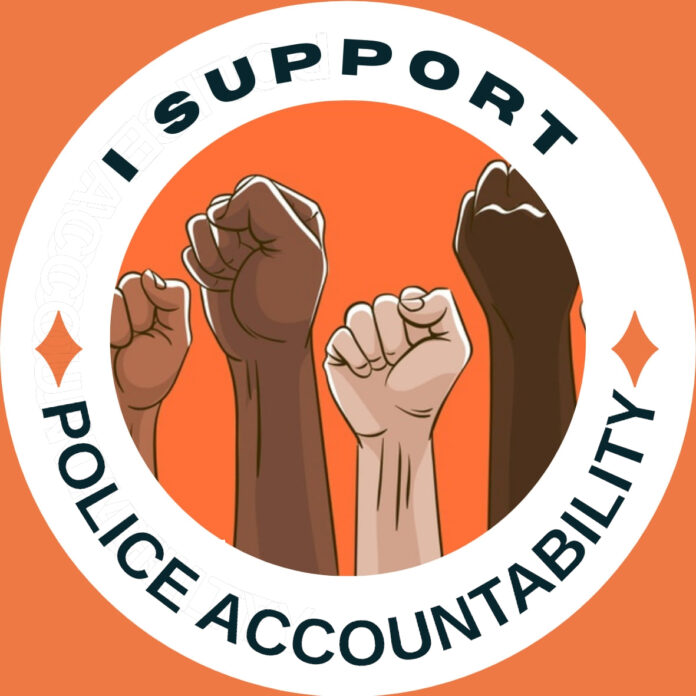The Illinois Legislature passed a Police Reform Bill (HB 3653) through their lame duck session. This legislation was spear-headed by the Illinois Legislative Black Caucus. It passed the General Assembly 60-50, and the State Senate 32-23. The bill was signed into law by Governor J.B. Pritzker on February 22nd, 2021.

Does include:
Effective date July 1st, 2021:
- Statewide use of force policy.
- No driver’s license suspensions from failure to pay fines.
- Requires the maintenance of police misconduct records and requires the use of special prosecutors in officer-involved deaths.
- Requires departments to create a policy for receiving non-notarized complaints.
- Greater reporting to IL Attorney General and Federal government on deaths & use of force.
- Complete ban on chokeholds.
- Requires statewide standards and services for officers to receive regular mental health screenings and assistance, while ensuring that counseling and screenings remain confidential.
- Imposes upon police a duty to intervene in the excessive use of force by another officer and to render aid when necessary.
- Enhances whistleblower protections.
- Victims qualify for restitution regardless of criminal history.
- Expands police training on use of force and crisis intervention, as well as first aid training.
- Ban on military equipment:
- bayonets
- grenade launchers
- armored vehicles
- weaponized aircraft, vessels, or vehicles
- firearms & ammunition of .50-caliber or higher
- Changes parameters for no-knock warrants:
- requires safety plan for children & bystanders
- all officers must wear body cams while serving warrant
- must verify the correct address
- Adds new detainee rights when in police custody including:
- the right to make three free phone calls within three hours of arrival at the police station and before questioning occurs
- the ability to retrieve phone numbers contained in their cell phone’s contact list prior to the phone being placed in inventory
- requires conspicuous notice of these rights in police stations and booking rooms
- requires that the telephone number to the public defender or appointed attorney’s office must also be displayed.
- Makes it a class 3 felony for an officer to:
- lie about their conduct
- withhold information or lie about another officer’s conduct
- not follow Illinois body cam laws
- Prohibits people with less than four months on their sentence from being imprisoned and allows them to be diverted to electronic monitoring or another DOC facility or program.
- Increases services and programming for pregnant prisoners, and requires medical treatment of prisoners and detainees without unreasonable delay.
- Statewide data keeping of pretrial information
Effective date January 1st, 2022:
- Mandates certification of police officers through the Illinois Law Enforcement & Training Standards Board (ILETSB) & lowers threshold for decertification of officers.
- Police in municipalities with populations of 500,000 or more must wear body cams.
Effective date January 1st, 2023:
- Pretrial Fairness Act:
- abolition of money bail
- implementation of pretrial services
- police have greater discretion in who they incarcerate and who they give summons to.
- Police in municipalities with populations of 100,000 or more but under 500,000 must wear body cams.
- Requires underlying offense for resisting arrest charges.
Effective date January 1st, 2024:
- Police in municipalities with populations of 50,000 or more but under 100,000 must wear body cams.
Effective date January 1st, 2025:
- Ends prison gerrymandering, the practice under current law of counting prisoners toward a jurisdiction’s census count rather than their permanent address.
- Police in municipalities with populations under 50,000 must wear body cams.
.
Does not include:
- Removed from bill:
- abolish qualified immunity
- restrictions on police collective bargaining
- residency requirements
- various financial penalties for violations of the law or failure of agency to comply with law
- prevent the purchase of:
- camouflage uniforms
- fully automatic weapons
- silencers
- drones with military grade surveillance
- chemical incapacitates, including tear gas and other chemical irritants
- Police propaganda:
- abolition of felony murder
- eliminate charges for habitual offenders
- criminalize being a police officer
- prevent the use of force
This bill was sponsored by state Rep. Justin Slaughter and state Sen. Elgie Sims, Democratic Black Caucus members from Chicago. While the Pretrial Fairness Act was originally a stand alone bill, a number of reforms were added.
Critics of police accountability complained about the length of the bill, and it being attached to other bills during the lame duck session. On January 5th, it appeared like lighting as an amendment to a rather banal prescription drug bill, HB 163. Activists knew there was a push to get the Pretrial Fairness Act passed during the lame-duck session; but, many had no idea that along with the Pretrial Fairness Act, a plethora of largely reformist policing changes1 were added as well. Predictably, every police union threw an apoplectic fit resulting in absurd statements like “this bill will make it a crime to be a police officer” or “the end of the law enforcement profession as we know it;” or, flat out lies like “it abolishes felony murder” or “prohibits use of force in almost all situations, and makes officers criminally liable for virtually any use of force.” The sponsor of the original HB 163, Democratic State Rep. Katie Stuart, said she was unaware of the changes made to her bill and opposed the amendment. The police reform legislation was ultimately removed from HB 163 and placed as an amendment to HB 3653. Stuart voted against it.
Law enforcement officers keep alleging they weren’t informed about any of these changes; that they’re being left in the back when it comes to solutions. Yet, it’s of their own choosing. Since the past year of black liberation uprisings, the police – the ones who currently have the most power & discretion – have not taken the lead at all. We aren’t seeing police advocate for greater accountability. We aren’t seeing the police request powerful civilian review boards or more civilian oversight; on the contrary, police union contracts explicitly restrict civilian review boards investigatory power: “The employer shall not compel a bargaining unit employee to speak or testify before, or to be questioned by, a citizen review board or similar entity relating to any matter or issue.”2 We aren’t seeing the police willing to even think about changes to qualified immunity. They’ve had plenty of time to see the escalation in anger from the general public.
.
The police keep saying they understand there needs to be reforms; and, they actually want to change it all. Pekin Police Chief John Dossey says he understands that there is room for improvement in policing. “I’m certainly not in opposition to change. I think improvement’s something we’re working towards,” Dossey said.
Tazewell County Sheriff Jeff Lower & the allegedly “woke” Peoria County Sheriff Brian Asbell say they want transparency so badly, they just can’t wait. But, “you need to have a slower approach,” said Asbell. It’s always too soon; it’s always they didn’t have enough input; it’s always going to happen down the road.
In response, the Senate Black Caucus distributed their own release, saying, “From our perspective, our communities know what they need in order to be kept safe. We come from the communities we represent. Our experiences, combined with our understanding of policy, have shaped our legislative approach, and they cannot be dismissed when it comes to determining what our communities need.”
.
What was won?
Use of Force policy:
This bill requires a new statewide use of force policy. Contrary to the ridiculous assertions by the police unions that this bill would “prohibits use of force in almost all situations, and makes officers criminally liable for virtually any use of force.” The bill actually states an officer is justified to use any force which that officer “reasonably believes, based on the totality of the circumstances, to be necessary to effect the arrest and of any force which he reasonably believes, based on the totality of the circumstances, to be necessary to defend himself or another from bodily harm while making the arrest.” So, essentially the exact opposite of what police unions are claiming. Why should anyone trust police union propaganda when they lie about such basic things?
Raymon Troncoso of Capitol News Illinois does an amazing job describing the new Use of Force policy:
A common complaint from law enforcement is that its not fair to judge incidents which require split-second decision making from the perspective of hindsight. It’s easy to see what should have been done in hindsight, which was not visible in the moment. In fact, this law explicitly states that police actions should not be judged through hindsight and one should take the interpretative framework of an officer in the moment. However, this bill stresses caution in officers, a consistent reminder in the back of one’s head to take in the totality of circumstances.
Purchase of military equipment:
The legislation prevents police department’s from purchasing a number of military grade equipment like: bayonets, grenade launcher, tracked armored vehicles, weaponized aircraft, vessels, or vehicles, & firearms/ammunition of .50-caliber or higher. However, the original legislation (HB 163) included prohibitions on: camouflage uniforms, fully automatic weapons, silencers, drones with military grade surveillance, and chemical incapacitates including tear gas and other chemical irritants
Police certification process:
The police reform bill greatly increases the power of the 18-member Illinois Law Enforcement & Training Standards Board (ILETSB) to decertify officers by a majority vote and prevent them from being employable anywhere in Illinois. “Any officer found to have acted illegally or inappropriately could face decertification. Currently, police officers can have their licenses automatically revoked if they are convicted of a felony or certain misdemeanors, such as criminal sexual abuse or theft. The proposed legislation would lower the bar for decertification and include offenses such as excessive force, perjury or tampering with evidence.” Furthermore, it does not require an officer be convicted in a court room for decertification to occur.
The Illinois Law Enforcement & Training Standards Board released the following statement regarding HB 3653:
This is a major reformist piece of legislation that will prevent bad officers from being shifted from one department to the next. But, before we celebrate too much, let’s take a look at who is on the ILESTB. Of the 18 board members, 83% of the members are either active law enforcement officers or retired law enforcement officers. Of the Illinois Law Enforcement Certification Review Panel, a panel created by the HB 3653 to investigate and recommend decertification, 63% of the members must be law enforcement officials. We want more civilian review because we don’t want only colleagues to be judging law enforcement behavior. We can’t address systemic issues when the one’s addressing it are part of the system and were raised by the system.
Abolition of Cash Bail within two years:
Many people were concerned about the two-year window for the abolition of cash bail to occur. However, if cash bail were truly abolished tomorrow, it would be pandemonium. The two years allows the Illinois Supreme Court to issue new guidance on how it expects the judiciary to implement this law. Judges, prosecutors, defense attorneys, public defenders, circuit clerks, police & sheriffs will all need to be trained on the new policies. The two year window allows the criminal justice system to adjust to this major institutional shift.
The Pretrial Fairness Act also mandates that counties report pretrial information to the state so the data is transparent. Currently, individual counties are allowed to decide what information they want to keep and what they don’t making it difficult to approach pretrial issues empirically and reducing accountability to the public. Judicial records–while public information–are not bound by Illinois FOIA laws, so can be difficult to obtain & analyze by an independent third party. These difficulties makes it difficult to track individual defendants from start to finish, revealing patterns in the long-term about trial outcomes & recidivism. At one point, Black Lives Matter BloNo had a volunteer team of court watchers for the purpose of identifying trends in cash bail data. This law changes this.
Furthermore, the bill creates a distinction between willful flight (i.e., intentionally avoiding trial) & simple failure to appear. For instance, currently, if a person’s court date is changed & they aren’t notified & they miss their court date, the judge must issue a bench warrant to immediately arrest that person. The Pretrial Fairness Act creates a distinction and specifically states that a mere failure to appear does not count against someone in a future trial on whether they are a fight risk or not. Under the Pretrial Fairness Act, if someone unintentionally misses their court date, the judge can set a hearing to revoke an individual’s release, and if the individual fails to make it to that failure to appear hearing, then an arrest warrant is issued for the individual. As long as an individual makes it to the Failure to Appear hearing, the individual won’t be incarcerated pretrial and the failure to appear won’t count against them.
Non-Notarized Police Complaints
.
What must we still fight for?
Several key reforms in HB 163 were stripped by the Senate in HB 3653.
Qualified Immunity:
Qualified immunity is a Supreme Court legal doctrine that protects individual officers from being held personally responsible if they violate a person’s rights. “By default, all government officials are immune from liability if they violate your rights. Whether your rights were actually violated doesn’t necessarily matter.” The bar is so high for proving an officer’s actions disqualify them from qualified immunity, that unless a previous court ruled that the exact same actions with the exact same circumstances were unconstitutional, qualified immunity will hold regardless of the underlying constitutional merits of the case.
“For example, the Ninth Circuit U.S Court of Appeals recently held that police accused of stealing $225,000 while executing a search warrant were entitled to qualified immunity because that court had ‘never addressed whether the theft of property covered by the terms of a search warrant…violates the Fourth Amendment.’ It did not matter ‘that virtually every human society teaches that theft generally is morally wrong.’”3
Qualified immunity is something Tazewell County Sheriff Jeff Lower says ensures officers are able to do their jobs. “Qualified immunity protects you if you’re following the law, you’re following the policies of the department, and you’re following the constitution…that’s the only time it protects us,” said Lower. Sheriff Sandage has said he worries if qualified immunity is abolished, that no one will ever want to be an officer again. Police unions said it would become open season on officers being sued for frivolous issues. Normal Police Chief Rick Bleichner opposed abolishing qualified immunity as well.
“That kind of sucks because these are policies that you think the police force would embrace. I think we saw early last week when white mobs rushed the U.S. Capitol: As many injuries as there could’ve been, and that didn’t happen. Officers showed restraint. That needs to be a national trend, but they also need to be held accountable for violating people’s rights,” Brown said.
However, even if qualified immunity were abolished, this doesn’t mean civil suits would be paid by individual officers. Most police union contracts have indemnification articles that shift liability to the municipality. But, getting rid of qualified immunity is still important because increasing the tort liability typically increases accountability & leads to safer conduct. “Putting municipalities on the hook for their officers’ rights violations even when the underlying conduct fell into an arguable gray area at the time it took place would give municipalities a strong financial incentive to train, supervise, and discipline their officers.”
Abolishing qualified immunity is important because civil suits are often the only means individuals can be compensated for unconstitutional police activity. “In practice, civil lawsuits are often the only means to seek justice at all because prosecutors—themselves government officials—are typically reluctant to bring criminal charges against their government colleagues, especially police officers who are crucial to the work prosecutors do on a daily basis.”
Police unions:
The original HB 163 legislation greatly curtailed the power of police unions, though it did not eliminate them. Those provisions say that “employers, which would refer to municipal governments at the county or city level, would not be required to negotiate with unions regarding the discipline or discharge of law enforcement.”
Basically, police unions would only be able to negotiate over wages, benefits, & working conditions; the exact same things every other union can negotiate for. The difference is we don’t empower teachers, nurses, or builders to take away people’s life & liberty. Workers form unions because there is a severe power imbalance for them in relation to their bosses. This imbalance simply does not exist in the same ways for police officers.
Add the fact that most police officers do not live in the communities they police. According to At-Large Peoria City councilperson Dr. Ali, 90% of Peoria police officers live outside the city of Peoria. We have people that don’t pay property taxes in our cities, who with the help of the police unions, can veto the legislative interests of the people in the city. “We believe that the authority to mandate implementation should not be dependent on the will of the police department, but rather certain reforms should be codified at the state,” said Cook County Board President Toni Preckwinkle.
We must prevent police unions from demanding blanket indemnification from bad behavior. We must prevent any ban on civilian oversight of police behavior. We must prevent the police from monopolizing a community’s own responses & wishes when it comes to public safety, effectively nullifying any experiments with alternative public safety measures.
Penalties for non-compliance:
Finally, the original HB 163 included several sections dedicated to penalizing police departments that refused to implement the law. It said if police departments did not comply with the directives around body cams & other reforms within a certain time frame, the risked a 20% reduction in state funds.
How this is controversial escapes rational contemplation. If someone gets a ticket for speeding, they pay a fine. That fine is meant as a way to gain compliance with the law & inhibit future speeding. Despite the importance of law & order among the Defend the Blue crowd, actually being punished for failure to follow the law doesn’t fit into their narrative when it’s the police breaking the law.
.
Defund vs. Reform
Police unions quickly labeled the police reform measures as a Defund the Police bill. Of course, the truth belies these accusations. This was almost entirely a reform the police bill. The Defund movement means to take funds & responsibilities away from the police and invest them in alternative structures. Defunding ideology rejects the notion that every social ill can be fixed by throwing a police officer at it. Reformism in policing doesn’t go this far; it seeks to correct the already existing institution of policing by giving them more resources. The new certification requirements, use of force policies, ban on chokeholds, new warrant requirement, new training requirements, & body cam requirements (despite being important measures that should be supported) do not take resources & responsibilities away from policing. In some cases, it actually does the opposite because it seeks to regain legitimacy within the existing institution of policing.
Even the penalties for noncompliance that were removed from the final bill, are not defund mechanisms. As long as police departments follow the law, they don’t lose any money. If they fail to comply, it’s not as if their responsibilities will shift to some other entity; they have merely chosen to do more with less.
While this bill is not a defund bill, there are some features that will likely have that effect. One part of the bill that was not stripped allows access to state police funding for “other first responders.” It also encourages the development of “deflection programs” that aim to solve social ills without entrance into the criminal justice system or emergency rooms. According to the bill, “Funding for deflection programs shall be prioritized for communities that have been impacted by the war on drugs, communities that have a police/community relations issue, and communities that have a disproportionate lack of access to mental health and drug treatment.” Deflection programs include “co-responder approaches that incorporate behavioral health,peer, or social work professionals with law enforcement or other first responders at the scene.” It also expands who is considered a first responder to include any type of medical worker or agency that is labeled as such by a government entity.
Abolishing cash bail lets officers spend less time keeping individuals in custody and less time processing arrests. It reduces the amount of time and the amount of occasions in which individuals would be in contact with the police; and this means a reduction in the time an individual’s freedom is constrained or otherwise placed in jeopardy whether through detainment, arrest, or imprisonment. Ending money bail will also dramatically decrease jail populations; currently, the overwhelming majority of inmates in county jails are there pretrial and haven’t been convicted of a crime.
Other measures like prohibiting people with less than four months on their sentence from being imprisoned & raising the age someone can be legally labeled an habitual offender will lead to further decarceration.
Finally, the current court system relies heavily on cash bail to maintain itself. The reason the final bill gave a two year implementation for pretrial services was precisely to give courts the chance to create alternatives to ransoming people.
Organizers should absolutely celebrate this historic win. Everyone who spent countless hours this past year marching, agitating, organizing, & lobbying can finally see the mountaintop on, at least, some real systemic change. And, while the changes are still fundamentally reformist in nature, they are far more efficacious than the performativity we saw from corporations around the term “BlackLivesMatter” or the changing of street names or antiquated advertising characters. We must continue to fight to defund the police and build robust alternatives for addressing public safety issues. We must support the abolition of qualified immunity & limits on the power of police unions. The one thing this process should teach us is: when we fight, we win.
UPDATED: 01/18/2021; 1/22/2021; 6/2/2021
This article was originally published on Strangecornersofthought.com.
- Don’t get me wrong: I agree with everything in these bills.
- Bloomington police union contract
- https://ij.org/frequently-asked-questions-about-ending-qualified-immunity/






























